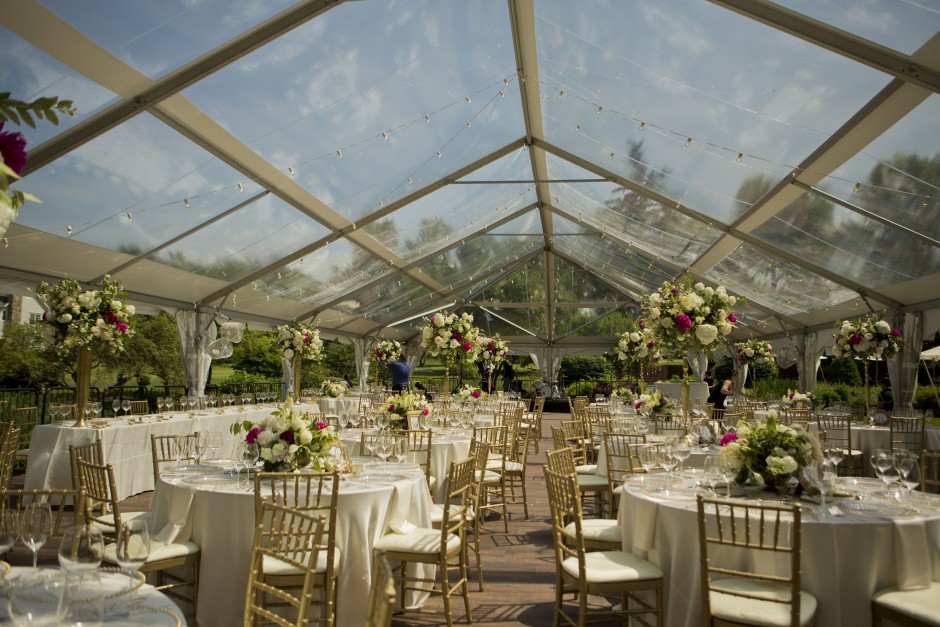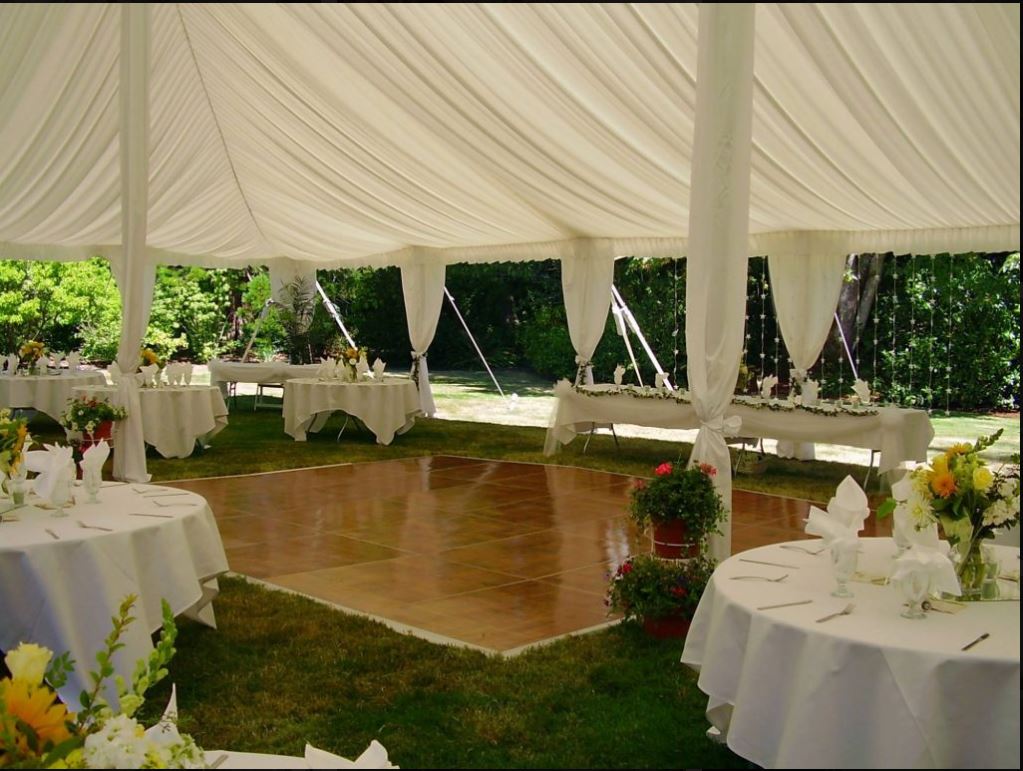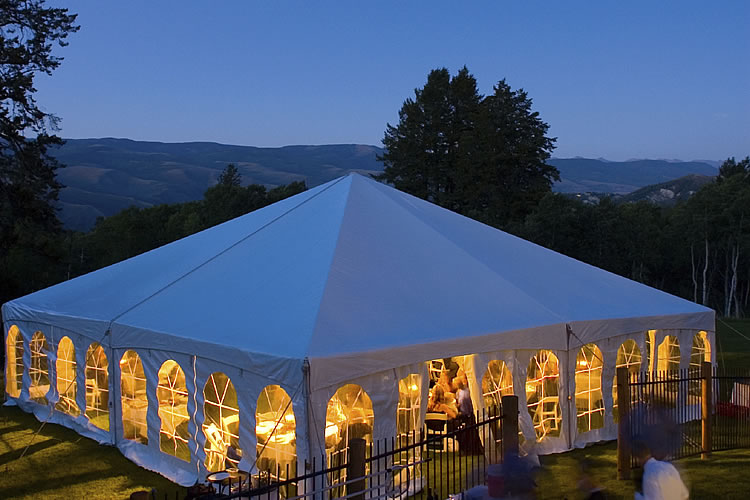I. Tent Size and Capacity

The size of the tent is one of the primary factors that determine the rental cost. The larger the tent, the more materials and labor are required, resulting in a higher price. It is essential to determine the right tent size for your wedding to avoid overspending or overcrowding.
- Determining the Right Tent Size for Your Wedding
When selecting a tent, consider factors such as the number of guests, the layout of the event space, and any additional elements you plan to include, such as a dance floor or buffet area. Tent rental companies can provide guidance on the appropriate size based on your specific requirements.
- Factors Affecting Tent Size and Capacity
Besides the number of guests, other factors that affect tent size and capacity include the desired seating arrangements (such as banquet-style or theater-style), the inclusion of a stage or DJ booth, and the need for extra space for a bar or catering area. Discuss these details with the rental company to determine the most suitable tent size.
Tent Type and Style
The type and style of the tent also play a significant role in the rental cost. Different tent types offer varying levels of elegance, durability, and customization options. Understanding the pros and cons of each type can help you choose the ideal tent for your wedding while considering your budget.
- Choosing the Ideal Tent Style for Your Wedding
Common tent styles include pole tents, frame tents, and clear span tents. Pole tents have center poles that support the structure but may obstruct the interior space. Frame tents have a self-supporting frame, providing more flexibility in layout design. Clear span tents offer the most open space but tend to be the most expensive option.
- Comparing Costs of Different Tent Types
Consider the advantages and disadvantages of each tent type in relation to your wedding vision and budget. Pole tents are generally the most affordable, while clear span tents tend to be the priciest due to their larger size and more elaborate construction.

II. Assessing Your Wedding Budget
Before diving into the tent rental process, it is crucial to evaluate your overall wedding budget and allocate funds specifically for the tent rental.
A. Evaluating Your Overall Wedding Budget
Take a comprehensive look at your wedding budget, including expenses for venues, catering, decorations, entertainment, and other essential elements. This will help you determine how much you can comfortably allocate to the tent rental.
B. Allocating Funds for Tent Rental
Once you have a clear understanding of your overall wedding budget, decide on an appropriate portion to allocate for the tent rental. This will depend on your priorities and the significance you place on the tent as a central element of your wedding.
C. Considering Trade-offs and Prioritizing Expenses
If the tent rental cost exceeds your initial budget allocation, consider making trade-offs in other areas to accommodate the additional expense. Prioritize your wedding must-haves and consider adjusting other elements to ensure that the tent fits within your budget.
III. Obtaining Quotes from Tent Rental Companies
Once you have assessed your budget and determined your tent size and style preferences, it is time to start contacting tent rental companies to obtain quotes.
A. Researching and Contacting Rental Companies
Do thorough research to find reputable tent rental companies in your area. Read reviews, check their portfolio, and assess their experience in handling weddings. Contact several companies to gather information and request quotes.
B. Providing Detailed Event Information
To obtain accurate quotes, provide rental companies with detailed information about your wedding, including the date, location, desired tent size and style, and any specific requirements or additional services you may need. The more information you provide, the more accurate quotes you will receive.
C. Comparing and Evaluating Rental Quotes
Once you have received quotes from multiple rental companies, compare them carefully. Look beyond the price and consider factors such as quality of materials, customer service, included services (such as delivery and setup), and any additional charges. Balance the cost with the level of service and quality offered to make an informed decision.

IV. Additional Costs to Consider
When budgeting for tent rental, it is essential to also account for additional costs that may arise.
A. Delivery, Setup, and Takedown Fees
Most tent rental companies charge fees for delivery, setup, and takedown services. These fees cover transportation, labor, and the time required to assemble and dismantle the tent.
- Understanding Delivery and Setup Charges
Delivery and setup charges vary depending on the distance to the venue, the complexity of the installation process, and any additional services required, such as leveling the ground or anchoring the tent.
- Factoring in Takedown and Return Fees
Remember to include takedown and return fees in your budget. These fees cover the labor and time required to dismantle and remove the tent from the venue.
B. Permit Costs and Insurance
Depending on your location and the specific requirements of your event, you may need to obtain permits and insurance coverage for the tent.
- Checking Permit Requirements and Costs
Contact your local authorities to determine if any permits are needed for setting up a tent. Some venues may also have specific regulations regarding tent installations. Factor in any permit fees when budgeting for the tent rental.
- Considering Insurance Coverage for the Tent
Check with the rental company and your insurance provider to ensure that you have adequate coverage for any damages or accidents that may occur during your wedding. Some venues and rental companies may require proof of insurance before allowing the tent to be set up.
V. Budgeting for Tent Accessories and Decorations

Lastly, consider the cost of tent accessories and decorations when setting your budget. These elements can significantly enhance the ambiance and aesthetics of the tent.
A. Flooring Options and Costs
The type of flooring you choose for the tent can impact the overall cost. Options range from basic ground covering to more elaborate options such as wooden or carpeted floors.
- Exploring Different Flooring Choices
Consider factors such as comfort, aesthetics, and the specific activities that will take place in the tent when selecting the flooring. Discuss the available options with the rental company to determine the most suitable choice for your wedding.
- Estimating Flooring Costs
Flooring costs vary depending on the type and size of the tent, as well as the chosen flooring material. Request quotes from rental companies to determine the approximate cost for your specific requirements.
B. Lighting and Electrical Considerations
Proper lighting is crucial for creating the desired atmosphere in the tent. Additionally, electrical requirements for lighting, sound systems, and other equipment should be budgeted for.
- Planning Lighting Design and Setup
Work with a lighting specialist to design a lighting plan that complements your wedding theme. Consider options such as string lights, chandeliers, and uplighting. Discuss your vision with the rental company to determine the electrical needs and associated costs.
- Budgeting for Electrical Requirements
Ensure that your chosen tent rental company can provide the necessary electrical infrastructure to support your lighting and other electrical needs. Factor in any additional costs for generators or extra equipment that may be required.
C. Decorative Elements and Upgrades
To personalize the tent and make it uniquely yours, consider adding decorative elements and upgrades.
- Choosing Decorative Elements for the Tent
Options for tent decorations include drapes, swags, centerpieces, floral arrangements, and themed props. Decide on the desired decorative elements and discuss them with the rental company to determine any associated costs.
- Calculating Costs for Upgrades and Enhancements
If you have specific upgrades or enhancements in mind, such as climate control systems, specialty flooring, or custom decorations, make sure to include the additional costs in your budget. Discuss these options with the rental company to obtain accurate pricing information.
